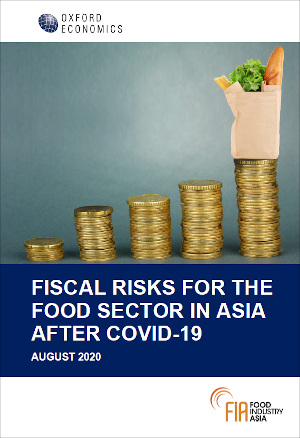Ungated Post | 21 Aug 2020
Fiscal risks for the food sector in Asia after COVID-19

This paper, the second in our series of three examining the impact of the coronavirus pandemic on the food sector in Asia, looked at the potential fiscal risks to the sector arising as a result of the pandemic.
In this report, produced on behalf of Food Industry Asia, we examine the impact of the coronavirus pandemic on government balance sheets around Asia, and the potential implications this might have for the food industry across the region. We develop a Fiscal Risk Framework which benchmarks the differing fiscal cost across economies and a range of channels through which the food industry could be exposed to government efforts to rebalance the books.
We find fiscal risks to the food sector to be most-pronounced in three ASEAN economies (Philippines, Indonesia and Thailand), with Malaysia also worth highlighting as a result of especially-urgent health challenges.
For more information and to access the study, please visit: here
Our economic consulting team are world leaders in quantitative economic analysis, working with clients around the globe and across sectors to build models, forecast markets and evaluate interventions using state-of-the art techniques. Lead consultants on this project were:
Oxford Economics’ team is expert at applying advanced economic tools that provide valuable insights into today’s most pressing business, financial, and policy issues.
To find out more about our capabilities, contact:
EMEA
Graeme Harrison
+44 28 9263 5417
Email
Americas
Mike Kleinman
+1 (610) 995 9600
Email
Asia
Tom Rogers
+65 6850 0115
Email
Related Services

Post
The economic impact of abandoning the WTO
Oxford Economics have been commissioned by the International Chamber of Commerce (ICC) to provide an independent assessment of the economic impact of WTO dissolution. This report details our findings and the assumptions underpinning our analysis.
Find Out More
Post
The economic impact of the sports activities of public service media
This study shows how the sports activities of public service media supported €4.5 billion of GDP and 57,000 jobs across 31 European countries in 2022. The report also highlights wider economic benefits of public service media sports coverage, such as the way in which it leverages sponsorship income for sports bodies.
Find Out More
Post
Global Trade Education: The role of private philanthropy
Global trade can amplify economic development and poverty alleviation. Capable leaders are required to put in place enabling conditions for trade, but currently these skills are underprovided in developing countries. For philanthropists, investing in trade leadership talent through graduate-level scholarships is an opportunity to make meaningful contributions that can multiply and sustain global economic development.
Find Out More